
Words by Smiley Team
In light of the coronavirus pandemic, the Special Needs Network, based in California, has mobilised to support disabled people and their families to access the support they need during this testing time.
The Network was founded in 2005 by Areva Martin after she struggled to access support for her autistic son. Realising the lack of support, particularly in underserved communities like the neighbourhood of South Los Angeles, Martin used her skills to form a Network to help parents like her advocate for their children and get the support they need.
The Special Needs Network provides resources and advocacy for disabled young people and their families. As a result of the pandemic, their services have increased drastically and the usual ways of working have had to be significantly adapted.
Areva Martin, founder and president of the Special Needs Network says that ‘Since the Pandemic, we have developed a series of online programs from webinars to training classes to help relieve the stress of our constituents.’
Classes range from yoga to strength training, nutrition, advocacy training and cooking. In addition to this, they have also opened a pantry and developed a 24 hour hotline to provide support as and when it is needed. There is also a COVID-19 weekly talk show to keep the community up to date with breaking news, expert advice and information.
A large number of the families the Network supports have lost their jobs, are having to risk their health in ‘essential jobs’, live in food deserts and many are forced to rely on food banks or other assistance. or are struggling with the lack of disability-specific education and support services specifically available to them.
You can watch The Special Report on Facebook Live on Mondays, Wednesdays and Fridays at 10 a.m. PST.
Sign up for updates, donate to help the Special Needs Network continue to help families with disabilities and those living in underserved communities.
By the Smiley Movement Team